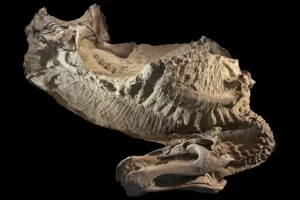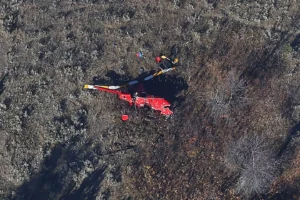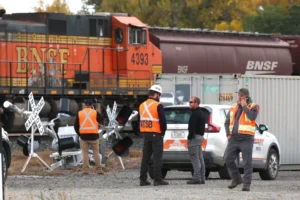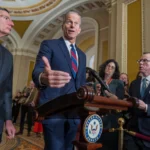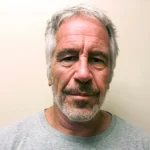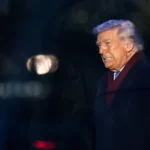Entrepreneur Talks Crypto, Mammoths and Aliens at Blockchain Event
Charles Hoskinson calls Wyoming ‘an amazing state to do business in’
- Published In: Other News & Features
- Last Updated: Sep 24, 2023
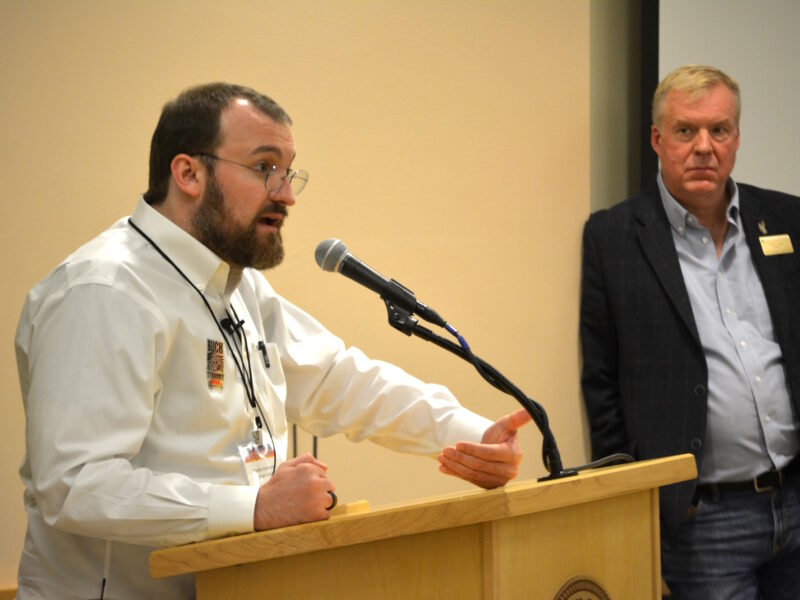
Input Output Global CEO Charles Hoskinson delivers a keynote address at the Wyoming Blockchain Stampede on Sept. 15, while Steve Lupien, director of the University of Wyoming’s Center for Blockchain and Digital Innovation, looks on. (Wyoming Truth photo by CJ Baker)
By CJ Baker
Special to the Wyoming Truth
LARAMIE, Wyo. – Years ago, when Wyoming lawmakers began their push to make the state a destination for the cryptocurrency industry and digital assets, former state Rep. Tyler Lindholm admits there was some uncertainty as to whether the effort would pay off.
But, Lindholm recalled this month, there was “a singular moment that stands out to me where I knew maybe we didn’t suck. And that’s when Charles contacted me.”

The Charles in question, Charles Hoskinson, is a big name in the crypto space, having played leading roles in the launches of two of the largest blockchains, Ethereum and Cardano. So when Hoskinson shared that he’d domiciled his company, Input Output Global, in Wyoming, “I was like, ‘Oh, holy s—,’” Lindholm said.
While he’s not without critics, Hoskinson’s celebrity status was on display at the Wyoming Blockchain Stampede. Although Gov. Mark Gordon enjoyed a warm reception, it was Hoskinson who had fans lining up for pictures after his keynote — a freewheeling address that covered everything from the state of the crypto industry to his efforts to scour the ocean for signs of alien technology.
Hoskinson is a jet-setter and based in Colorado, but he’s built substantial ties to the state: Not only have he and his firm become major backers of the University of Wyoming’s Center for Blockchain and Digital Innovation (Input Output was the stampede’s title sponsor), but he also runs 600 bison on a ranch outside of Wheatland and started a medical clinic in Gillette with his family that he said serves 4,000 patients.
“From some of the big dogs [in crypto], we do get a lot of talk,” Lindholm said as he introduced Hoskinson, but Input Output “actually did that thing. And they actually put in the work.”
Hoskinson returned the compliments in his speech, describing Wyoming as “just an amazing state to do business in.”
“It’s pretty special,” he said, praising the accessibility of the state’s officials and the way they’ve rolled out the red carpet for the industry.
In contrast, the federal government has taken a dim view of the space, particularly under the Biden administration. Securities and Exchange Commission Chair Gary Gensler recently told Congress he’s “never seen a field that’s so rife with misconduct.”
The federal crackdown was shaped in part by a series of multi-billion dollar implosions in the industry, including the collapse of the crypto exchange FTX.
Former FTX CEO Sam Bankman-Fried had the ear of Capitol Hill, so the allegations that he was a fraud have hit particularly hard.
“There was a real good chance we were going to pass a law that was pretty good for crypto and would have allowed the industry to have good rulemaking,” Hoskinson said, but, “it went from, they’re taking our calls and working with us to, ‘We’re now going to try to destroy your entire industry.’”

Finding real value
Hoskinson added that the industry has hurt its own cause by measuring success by a token’s price. Many times, he said, blockchains are treated as “speculative instruments to enrich a few people” instead of platforms.
“It’s not about problems we’re solving, it’s not about making your customers’ life safer and better. It’s about doing something so I can get a press release, so I can get a token appreciation, so I can dump tokens on retail investors,” Hoskinson said, adding, “You will never get mass adoption until we’re past that.”
Crypto has grown exponentially since he entered the space a decade ago — making him something of an elder statesman at 35 — but he still sees barriers to entry. Beyond regulations there’s the “radical accountability” of being your own bank, security issues and the nerve-wrecking process of sending digital assets. Transferring crypto typically involves copying and pasting a long string of letters that represents a specific address on the blockchain; a wrong character can lead to the funds being lost.
“I invented the system, g—d d—t, [and] I’m terrified,” Hoskinson said of sending crypto. “You know, this is me and I’m trembling. How the hell is grandma going to figure all this out?”
But ultimately, Hoskinson is bullish on the industry’s future, suggesting blockchain tech can help with everything from trading carbon credits to proving your age without having to reveal everything on your driver’s license. He even mentioned election systems, in which blockchains could allow voters to verify their ballots.
“I think [in] the next five or 10 years, we’ll crack it, and we’ll start having those killer use cases,” he said. “And then it’ll just kind of work its way in.”
Mammoths and aliens
Hoskinson became a billionaire in the crypto space, but his interests have taken him far afield. He’s among several prominent investors in Colossal, which wants to bring back the woolly mammoth, the dodo and other extinct species, while the Hoskinson Medical Clinic in Gillette plans to partner with UW to research regenerative medicine and anti-aging.
In June, Hoskinson funded a $1.5 million “Interstellar Expedition” north of Papua New Guinea, searching for bits of an unusual meteorite that reached Earth in 2014. The effort involved sending a magnetic sled 6,000 feet underwater to scrape the sea floor; Hoskinson said he and the rest of the crew worked in shifts around the clock to collect the material picked up by the magnets.
The search yielded hundreds of tiny spherules, and Harvard astrophysicist Avi Loeb has said their unusual composition could reflect “an extraterrestrial technology.” However, Hoskinson said they’re more likely to have come from an exploding planet — potentially representing the first recovery of a meteor from outside the solar system.

“That’s cool,” he said. “It doesn’t need to be aliens to be cool.”
What the world needs
The manic bull runs of cryptocurrencies, in which tokens skyrocket in value, are often driven by FOMO — the fear of missing out. But Hoskinson described urgency as a hallmark of a scam, as there are always new opportunities to innovate.
“The thing I’ve learned about entrepreneurship is it’s like trains,” he said. “You miss one, another one comes.”
In his remarks, Hoskinson fretted about a central bank digital currency being deployed to implement ESG mandates and the strong-arm tactics of federal regulators, among other complaints. But in the end, he said, “We’re OK, and the industry will be OK.”
The first cryptocurrency, Bitcoin, arose from the wreckage of the 2008 financial crisis, in which, as Hoskinson described it, the government “fixed it by not putting anybody in jail, letting them keep all the money, and hiring the very same bankers who created the problem to fix the problem. And then the big banks got bigger.”
“Some people got really cynical about it,” he said. “And other people said, ‘Well, f— it, we’re just gonna build our own money.’”
He encouraged Stampede attendees to stay similarly focused on fixing problems – and he called Wyoming one of the best places to do it.
“It’s where real people are doing real things to solve problems for everyday people,” Hoskinson said. “And that’s what the world needs.”



